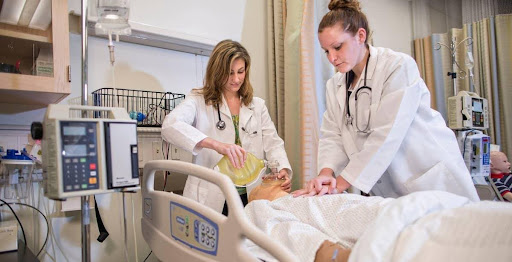- Introduction - NHS Roles & Standards: Developing Best Practice
- 1.1 Duties and responsibilities of own work roles
- 1.2 Relevant Standards to promote best practice in the health and social care sector
- 1.3 Values, Belief, and experiences that may affect working practice
- Worried about poor grades due to unclear concepts?
Introduction - NHS Roles & Standards: Developing Best Practice
This report aims to develop an understanding of personal and professional development in Health and Social Care scenarios. When it comes to playing the role of Health and Social care workers, the first and foremost duty that has to be maintained is to develop knowledge and skills regarding delivering care service to people with specific needs and continue the learning process and reflecting on what they or “I” will do. In this report, focus will be given to my duties and responsibilities as a health and social care worker in NHS of the UK along with the reflection on my values, belief system, and experiences that I have to develop to promote my best practice in relevant sectors and working performance.
1.1 Duties and responsibilities of own work roles
The duties and responsibilities of health and social care workers used to vary in the NHS UK based on the roles and the specific needs of the patients whom they are serving. As a health and social care worker in NHS, my duties and responsibilities were to provide care, medical, and psychological support, including the administration of medication to patients with specific needs (Woolham et al., 2019). Another role was to maintain accurate and up-to-date records of patient care and carry out the partnership working with the patients, their family members, and other care providers and healthcare professionals at workplace setup to provide the best care and services to the patients with specific needs. Another important duty and responsibility of my work roles as a healthcare provider was to respect the dignity, and individuality of the patients along with ensuring that the privacy of the patients is being maintained properly (Glendinning et al., 2015).

Figure 1: Role and duties of health and social care workers in a Healthcare setup
As a whole, as a health care worker, my duties and responsibilities in the NHS were:
- To uphold patient confidentiality
- To advocate the patient's rights and promote a safe and inclusive environment for the patient at health care setup
- To continue the professional development and ensure the care providers and health care professionals are adhering the ethical standards and committed enough to deliver high-quality care
1.2 Relevant Standards to promote best practice in the health and social care sector
The health and social care sector of the UK operates under several regulations and standards which ensure the promotion of best practices and delivery of high-quality services in the chosen sector. These standards are essential to promote the best practices, safeguard the individuals, and maintain dignity and integrity of care within the workplace setup. Some of the key standards are:
- CQC or Care Quality Commission Standards- the CQC or Care Quality Commission is used to regulate and inspect the quality of healthcare services provided by NHS and other healthcare organisations in England. CQC has set up a fundamental standard to focus on safety, responsiveness, effectiveness, responsiveness, and care when it comes to delivering healthcare support and services to patients with specific needs (Picking, 2024). According to the CQC, adherence, and compliance with these standards can ensure that the services being offered by the healthcare organisation and care providers are patient-centric, well-led, and safe (Picking, 2024).
- National Institute of Health and Care Excellence or NICE- in the UK, NICE has set up evidence-based guidelines for health and social care workers and professionals. These guidelines are used to recommend promoting best practices in various areas of the healthcare setup, which includes public health, social care intervention, and clinical care (Raganella et al., 2024).
- Health and Social Care Act, 2008 (Regulated Activities) Regulation- this regulation outlines the fundamental principles and standards regarding the safety and quality that healthcare workers must adhere to and comply with while delivering care and support to patients (Sim et al., 2024).
1.3 Values, Belief, and experiences that may affect working practice

Figure 2: Values of health care workers in healthcare setup
The personal values, belief systems, and experiences of health and social care practitioners can have a significant impact on their working practices in the UK. According to Woolham et al., (2019), these factors can influence the way health and social care workers can interact with the patient, their families, and health care professionals in the workplace setup. Values system can be defined as the beliefs or actions that a healthcare professional should consider while delivering care services to a patient as it is the right for the individual (Mescouto et al., 2024). Every individual has different values. In the healthcare setup, the core values associated with authenticity, care, courage, connection, diversity, and compassion. These values should be embedded in the culture of healthcare organisations and considered to be important when it comes to offering compassionate, ethically viable, patient-centric care services. A belief system is a set of beliefs that individuals hold towards the world, society, and their surrounding. In healthcare, belief systems influence the way patient will understand the health concept and the way they will make informed decisions regarding their health and well-being. For example, for some people, health is considered as the absence of disease, whereas some believe that it is the balance between mind, body, and spirit (Sim et al., 2024). On the other hand, experience in healthcare setup can be defined as the range of interaction between patients and healthcare workers with which both parties can develop insights about the duty of care and code of practices (Raganella et al., 2024). For example, with the experiences, nowadays, healthcare workers are trying to leverage new-age digital technologies to increase patient safety and standard of services. As a healthcare worker, it should be important to be open to learning and accustomed to different cultures and beliefs so that “I” as a health and social care worker can offer culturally viable, and sustainable healthcare support to patients with specific needs.
Conclusion
To conclude this report, it can be stated that, healthcare providers used to deal with many roles and responsibilities, like providing healthcare support and care services to patients by maintaining their privacy, dignity, and individuality. Therefore, it should be important for a healthcare worker to comply with standards and regulations and remain open to learning and developing skills and approaches to promote the best practices.
Worried about poor grades due to unclear concepts?
Take control of your academic progress with high-quality Assignment Help that not only completes your tasks but also enhances your understanding. With detailed explanations and step-by-step solutions, these services are ideal for grasping even the toughest subjects while submitting impressive work on time.
References
Glendinning, C., Mitchell, W. and Brooks, J., (2015). Ambiguity in practice? Carers' roles in personalised social care in E ngland. Health & Social Care in the Community, 23(1), pp.23-32.
Hussain, M.S., (2025). Role of health literacy and motivational interviewing in building insight for self-management of diabetes mellitus. Middle East Journal Of Family Medicine, 7(10), p.130.
Mescouto, K., Olson, R.E., Costa, N., Evans, K., Dillon, M., Walsh, K., Jensen, N., Hodges, P.W., Lonergan, K., Weier, M. and Setchell, J., (2024). Fostering equitable change in health services: Using critical reflexivity to challenge dominant discourses in low back pain care in Australia. Journal of Health Services Research & Policy, 29(1), pp.12-21.
Picking, D., (2024). The global regulatory framework for medicinal plants. In Pharmacognosy (pp. 769-782). Academic Press.
Raganella, A.J., Vega, J.M. and Davidov, P., (2024). Public Order Standards: Moving the Public Trust Needle Forward. In Public Order Policing: A Professional's Guide to International Theories, Case Studies, and Best Practices (pp. 433-447). Cham: Springer International Publishing.
Sim, F., Wright, J., Yates, J. and Rahman, E., (2024). Personal and professional development, registration, regulation and revalidation in public health. In Working in Public Health (pp. 202-208). Routledge.
Woolham, J.G., Norrie, C.M., Samsi, K. and Manthorpe, J., (2019). Roles, responsibilities, and relationships: Hearing the voices of personal assistants and directly employed care workers. NIHR Policy Research Unit in Health and Social Care Workforce, The Policy Institute, King's College London, 10.



